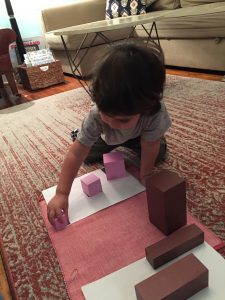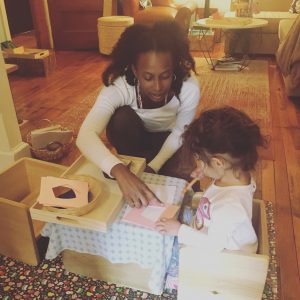Children learn through their entire being…
Maria Montessori
The Montessori Approach
The Montessori Method of education, developed by Dr. Maria Montessori, is a child-centered educational approach based on scientific observations of children from birth on. In Montessori environments, children learn to coordinate movement, develop sensory impressions, read, write and do math operations through simple yet carefully planned hands-on activities.
The Neuleaph Philospophy
At Neuleaph, we deeply respect the Montessori approach and its way of seeing each child as possessing a unique intelligence and array of interests in the world around them. We uphold the importance of a deep understanding of child development, and seek to find the important balance between structure and creativity, work and play, self-control and spontaneity.
Neuleaph Playgroup will first and foremost teach children through their senses, using developmentally appropriate materials in all the curriculum areas of the Montessori philosophy: Practical Life, Sensori-motor, Language/Literacy and Mathematics.
At all times, during their first explorations with learning, the teacher will be emotionally responsive to the needs of each child. She will strive to invite engagement, guide rather than direct, and stay in tune with the experience of each young student.
Emotional Development
These early years are the time for intense bonding with parents and close caregivers. Babies learn the give and take of human relationships from their first months of cooing back and forth with mom and dad. The children’s interactions in our warm, home-based environments will gently extend their emotional development to involve an intimate community of learners, including a teacher and peers.
In an effort to provide a bridge between the family and home, and the preschool environment, we have chosen to host the playgroup in an environment that is familiar to toddlers – a living room, bathroom, kitchen, hallway, back yard. We have also chosen to keep the group to no more than five children at a time, with a child/adult ratio of 1:3.
Babies and toddlers are very sensitive to order. During these early years children depend on external order to assist them in developing mental order. While the time they spend in the environment will put a priority on space and freedom for open work, we will follow a rhythm.
Drop-off: Children arrive, and are assisted to place their items in their basket and wash their hands with the basin and pitcher. They are welcomed into the classroom.
Circle of friends: Children gather in a circle to sing familiar songs, greet one another, do light moment activity or read a book
Open Work Time: Children work individually, in small groups, or one on one with the teacher. The teacher may choose to present a new work to the group, present each child a selected work based on her observations, or she might guide them in making their own choices from the shelves.
Group Snack: Children wash hands and prepare food together. They are supported to self-feed, remain at the snack table, and wash their hands once finished.
Gross Motor: Children leave the classroom to work with blocks, balls or household materials such as child sized brooms, mops, pots and pans. They will also engage in music and movement activities. When outdoor space is accessible and the weather permits they will always spend this period outside.
Goodbye meeting: Farewell song and story.
Montessori refers to the age between one and two as the age of “maximum effort.” As you well know, toddlers are often much more interested in what is in the cabinets, drawers and their dresser than they are in toys! They are internally motivated to learn how to work at this age, and given the opportunity will joyfully participate in day-to-day activities to care for themselves and the environment.
At Neuleaph Playgroup, children will have the opportunity to participate meaningfully in practical life work. They will learn skills of sorting, cleaning, using simple tools, hygiene and dressing. This work empowers young children at a time when they are seeking ways to feel confident and in control.
Young children learn by doing. In the Neuleaph environment children will have open access to a stimulating and ever-changing array of Montessori manipulatives that teach them about the world through their eager hands. The materials will be closely matched to their development, and the teacher will present new concepts and work alongside each child as they master new skills.
 Sensitive period for literacy and math concepts
Sensitive period for literacy and math concepts
The importance of the early years for language is widely known. Our environment will be rich with language, through songs and music, representational play, books and auditory pattern games. Children will explore the foundations of symbol recognition though object naming, visual discrimination and matching activities.
 Perhaps a more surprising sensitivity is for math. The brain has a sensitive period from birth to four years for setting patterns that will assist in lifelong mathematical ability. It is an established fact that toddlers exposed to simple math concepts do better in math later in school.
Perhaps a more surprising sensitivity is for math. The brain has a sensitive period from birth to four years for setting patterns that will assist in lifelong mathematical ability. It is an established fact that toddlers exposed to simple math concepts do better in math later in school.
Mathematics is like a language. The more children are exposed to it in natural living situations, the more they become adept in thinking mathematically. Children will learn the basis of numeracy through object transfer, one to one correspondence and simple counting.